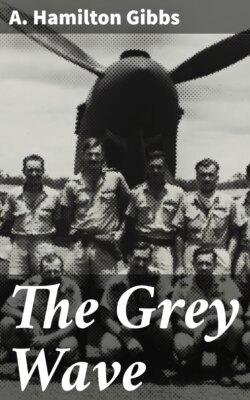Читать книгу The Grey Wave - A. Hamilton Gibbs - Страница 18
13
ОглавлениеThe next day, Sunday, we all hung about in a sort of uneasy waiting, without any orders.
It gave us all time to write letters home. If I rightly remember, absolute secrecy was to be maintained so we were unable even to hint at our departure or to say good-bye. It was probably just as well but they were difficult letters to achieve. So we tied one identity disc to our braces and slung the other round our necks on a string and did rather more smoking than usual.
Next morning, however, all was bustle. The orders had come in and we paraded in full fighting kit in front of the guardroom.
The Colonel came on parade and in a silence that was only broken by the beating of our hearts told us we were going out to face the Boche for our King and Country’s sake, to take our places in the ranks of a very gallant regiment, and he wished us luck.
We gave three rather emotional cheers and marched away with our chins high, followed by the cheers of the whole barracks who had turned out to see us off. Just as we were about to entrain the Major trotted up on his big charger and shook us individually by the hand and said he wished he were coming with us. His coming was a great compliment and every man of us appreciated it to the full.
The harbour was a wonderful sight when we got in late that afternoon. Hundreds of arc lights lit up numbers of ships and at each ship was a body of troops entraining,—English, Scotch and Irish, cavalry, gunners and infantry. At first glance it appeared a hopeless tangle, a babel of yelling men all getting into each other’s way. But gradually the eye tuned itself up to the endless kaleidoscope and one saw that absolute order prevailed. Every single man was doing a job and the work never ceased.
We were not taking horses and marched in the charge of an officer right through the busy crowd and halted alongside a boat which already seemed packed with troops. But after a seemingly endless wait we were marched on board and, dodging men stripped to the waist who were washing in buckets, we climbed down iron ladders into the bowels of the hold, were herded into a corner and told to make ourselves comfortable. Tea would be dished out in half an hour.
Holds are usually iron. This was. Furthermore it had been recently red-leaded. Throw in a strong suggestion of garlic and more than a hint of sea-sickness and you get some idea of the perfume that greeted us, friendly-like.
The comments, entirely good-natured, were unprintable. There were no bunks. We had one blanket each and a greatcoat. My thoughts turned to the first-class stateroom of the Caronia in which only four months previously I had had no thought of war. The accepted form of romance and the glamour of war have been altered. There are no cheering crowds and fluttering handkerchiefs and brass bands. The new romance is the light of the moon flickering on darkened ships that creep one after the other through the mine barrier out into deep waters, turning to silver the foam ripped by the bows, picking out the white expressionless faces of silent thousands of khaki-clad men lining the rail, following the will-o’-the-wisp which beckoned to a strange land.
How many of them knew what they were going to fight for? How many of them realized the unforgettable hell they were to be engulfed in, the sacrifice which they so readily made of youth, love, ambition, life itself—and to what end? To give the lie to one man who wished to alter the face of the world? To take the part of the smaller country trampled and battered by the bully? To save from destruction the greasy skins of dirty-minded politicians, thinking financially or even imperially, but staying at home?
God knows why most of us went.
But the sting of the Channel wind as we set our faces to the enemy drove all reason from the mind and filled it with a mighty exultation. If Death were there to meet us, well, it was all in the game.
